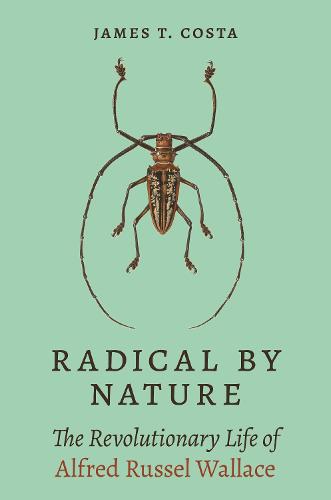
Marking the 200th anniversary of the birth of its subject, James T. Costa has written an entertaining biography of the man who famously arrived at the idea of natural selection independently of Charles Darwin: Alfred Russel Wallace.
Were I ever tempted to cheat on Darwin and direct my fanboy fascination elsewhere, Wallace would definitely be in with a chance. He led a long and fascinating life, fully deserving his place in the scientific pantheon in his own right, rather than being portrayed, as he sometimes is, as some under-appreciated unfortunate who was totally eclipsed by Darwin.
Following on from his excellent book on Darwin’s experiments, Costa does a great job telling the story of Wallace’s life, from his upbringing on the English-Welsh border, to his burgeoning interest in science, his early work as a surveyor with his brother, his befriending of fellow science-enthusiast Henry Walter Bates, and their decision to travel to South America to pursue their interests in exploration and science. It was in South America that Wallace, who eventually parted ways with Bates, first developed an interest in the geographical distribution of species—what we nowadays refer to as biogeography—a subject that was to become synonymous with Wallace’s name. Costa goes on to describe Wallace’s disastrous journey back to England, in which the ship he was travelling caught fire and sank with the loss of Wallace’s notebooks and large collection of valuable specimens.
Surprisingly undaunted, a few years later, Wallace was off naturalising and collecting again, this time in the Malay Archipelago (a problematic term these days, then used to describe the extensive group of islands between the South East Asian mainland and Australia). Here, over several years, assisted by a number of locals, Wallace travelled from island to island, collecting specimens, contracting diseases, and hypothesising in his down-time. It was here that Wallace earned his fame as a biogeographer, when he identified a hypothetical line running between the islands of the archipelago, on one side of which were found species with Asiatic characteristics, and, on the other side, species with a mix of Asiatic and Australian characteristics. This line was soon to become known as the Wallace Line.
Wallace had been convinced of the fact of organic evolution even before he set sail for South America, having read the controversial, anonymously written bestseller Vestiges of Creation (a book Darwin found to be utter rubbish). Costa describes how Wallace planned to theorise about evolution and, in particular, to address the arguments made against evolution in Charles Lyell’s influential book Principles of Geology. The same book had inspired Darwin–with its geology, rather than its arguments against evolution–during the Beagle voyage. Darwin and Lyell had since become close friends.
During his time on the Malay Archipelago, Wallace dispatched occasional scientific papers back to Britain. One of these, what is now known as his Sarawak Law paper (1855), concluded that ‘Every species has come into existence coincident both in space and time with a pre-existing closely allied species.’ Back in Britain, Darwin was largely unimpressed—as far as he was concerned, the paper contained no new ideas he hadn’t already thought of himself—although he did send Wallace some words of encouragement. But the paper Wallace sent Darwin three years later came as a total bombshell, outlining a theory of evolution pretty much identical to Darwin’s as-yet unpublished theory of evolution by means of natural selection. This led to a rather undignified rush to establish Darwin’s priority by publishing some old papers of Darwin’s alongside Wallace’s. It also caused Darwin to put to one side his long-planned, partially written, never-to-be-completed ‘big book’ on species, and to begin writing an ‘abstract’ that was to become On the Origin of Species. To his credit, Wallace expressed complete satisfaction at how his paper had been published alongside Darwin’s, and always maintained natural selection was Darwin’s theory, not his. Upon Wallace’s return to Britain a few years later, the two men were to become respectful, albeit not particularly close, friends.
I particularly enjoyed Costa’s account of Wallace’s life following his return from the Malay Archipelago. The tales of Wallace’s two great expeditions having been covered in detail, the pace necessarily picks up as there is a lot of ground still to cover over the remaining five decades of Wallace’s long life. Costa describes Wallace’s ongoing friendship with, and influence on, Darwin; his many books and papers; his financial difficulties; his marriage; his many relocations; his awards and honours; his debunking of flat-earthers; his embrace of spiritualism; his advocacy of women’s rights; his anti-vaxism; his campaigning for land-reform; his environmentalism; and his successful late lecture tour of the United States.
I did have a small number of quibbles with this book. In particular, when discussing Wallace’s Sarawak Law paper, Costa adopts the standard narrative that was (in my opinion, compellingly) debunked a few years back by science historian John van Wyhe. I assume Costa must be aware of this paper, but as far as I could see, he makes no attempt to address any of the points it raises. This could be seen as fair enough in what is supposed to be a popular biography, but Costa does, on the other hand, find space to mention—albeit adopting a neutral position—the supposed controversy over the arrival date of Wallace’s bombshell letter at Darwin’s house—a favourite non-topic of conspiracy theorists.
This and a few other irritations aside, I very much enjoyed Radical by Nature, and recommend it to anyone wanting to know more about a justifiably celebrated, fascinating figure from the history of science.
- Buy this book from Bookshop.org (UK) and help tax-paying, independent bookshops.
- Buy this book from Amazon.co.uk
- Buy this book from Amazon.com
Disclosure: I received a free review copy of this book from the publisher.
Leave a Reply